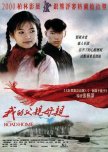This review may contain spoilers
You Might Be Hard=Pressed to Find a Sweeter and More Loving Film Than This Masterpiece!
With all of the complex love stories that come out of Hollywood these days, you sometimes enjoy the refreshing feeling of a love story that is simple. I am not necessarily stating that one is better than the other, but you often find that many complex love stories just don't completely work. The Road Home is a beautiful, simple love story that is as simple as the time and location in which it takes place, and the pieces fit together like a simple jigsaw puzzle.
The son of Zhao Di has come home to the village where is mother is from. He learns that his father has passed away. While the son grew up in the village, he has spent much of his adult life in the city. He has come home to be with his mother and to help her makes plans for his father's burial. His mother insists that his father be walked from the city hospital back to the village. Understand that this is no easy task since the village is good distance from the city. Her son tries to talk her out of it, but she is adament. And it is in the re-telling of how Zhao Di met her husband that convinces both the son and audience to understand why she wants to walk her husband back to the village.
The film takes off from here as the talented Zhang Ziyi portrays the young Zhao Di. She is an eighteen year-old girl living with her blind mother. She is a beautiful young woman with many suitors wishing for her hand in marriage. She has turned them all down. We don't know why except that we can guess that she hasn't found what she's looking for in a husband. Enter Luo, the new school teacher who has come to the village after living in the city. Zhao Di is immediately captivated upon first seeing him.
The sweetness in this film is in the simplicity of the village and the time. Water must be fetched from nearby wells. Looms are used to make clothing and cloths. And even the "courtship" that is done more by Zhao Di than by Luo is sweetly simple. She uses her culinary talents to make the best dishes with the hope that Luo will eat from her dish. She waits by the road for one glimpse of Luo. She walks to the well that is near the school for the chance that she might see or hear Luo.
People often make the mistake that the more primitive a technological country, the more unhappy the people must be. And yet,Zhao Di is not an unhappy girl. She is an excellent cook, and she enjoys looking after her mother. You get the sense that she does this not out of a sense of duty, but because she wants to. Zhao Di never lives anywhere else but in the village. The village is where she is happy.
Zhang Ziyi is simply brilliant is capturing the sweetness and determination of Zhao Di. She portrays Zhao Di with a fierce persistence to win the heart of Luo at any cost. You will see several scenes in which she demonstrates this.
I must mention the cinematography. The locations and colors that are captured reveal an almost magical world with golden leaves on the birch trees and snow-swept hills of winter.
Director Yimou Zhang does a great job of incorporating the technology of the time period. In many ways, I was as captivated by the use of the loom, the sweatbox used for cooking dumplings, and the walk to the well as I was of the sweet love story. I like his use of black and white in the future, and then the use of color for the past. Most directors would do it the other way around. And yet the color used for the past seems to show that it is revealing a happier time when young Zhao Di was in the fullness of her life, and the black and white showing how life is swiftly coming to an inevitable close for her after the loss of her one true love.
The Road Home will capture your heart with its story and your eyes with its images. Many saints, masters, and philosophers over the course of the centuries have stated that love is actually very simple; it is we who make it complex. This beautiful film seems to truly capture that idea.
The son of Zhao Di has come home to the village where is mother is from. He learns that his father has passed away. While the son grew up in the village, he has spent much of his adult life in the city. He has come home to be with his mother and to help her makes plans for his father's burial. His mother insists that his father be walked from the city hospital back to the village. Understand that this is no easy task since the village is good distance from the city. Her son tries to talk her out of it, but she is adament. And it is in the re-telling of how Zhao Di met her husband that convinces both the son and audience to understand why she wants to walk her husband back to the village.
The film takes off from here as the talented Zhang Ziyi portrays the young Zhao Di. She is an eighteen year-old girl living with her blind mother. She is a beautiful young woman with many suitors wishing for her hand in marriage. She has turned them all down. We don't know why except that we can guess that she hasn't found what she's looking for in a husband. Enter Luo, the new school teacher who has come to the village after living in the city. Zhao Di is immediately captivated upon first seeing him.
The sweetness in this film is in the simplicity of the village and the time. Water must be fetched from nearby wells. Looms are used to make clothing and cloths. And even the "courtship" that is done more by Zhao Di than by Luo is sweetly simple. She uses her culinary talents to make the best dishes with the hope that Luo will eat from her dish. She waits by the road for one glimpse of Luo. She walks to the well that is near the school for the chance that she might see or hear Luo.
People often make the mistake that the more primitive a technological country, the more unhappy the people must be. And yet,Zhao Di is not an unhappy girl. She is an excellent cook, and she enjoys looking after her mother. You get the sense that she does this not out of a sense of duty, but because she wants to. Zhao Di never lives anywhere else but in the village. The village is where she is happy.
Zhang Ziyi is simply brilliant is capturing the sweetness and determination of Zhao Di. She portrays Zhao Di with a fierce persistence to win the heart of Luo at any cost. You will see several scenes in which she demonstrates this.
I must mention the cinematography. The locations and colors that are captured reveal an almost magical world with golden leaves on the birch trees and snow-swept hills of winter.
Director Yimou Zhang does a great job of incorporating the technology of the time period. In many ways, I was as captivated by the use of the loom, the sweatbox used for cooking dumplings, and the walk to the well as I was of the sweet love story. I like his use of black and white in the future, and then the use of color for the past. Most directors would do it the other way around. And yet the color used for the past seems to show that it is revealing a happier time when young Zhao Di was in the fullness of her life, and the black and white showing how life is swiftly coming to an inevitable close for her after the loss of her one true love.
The Road Home will capture your heart with its story and your eyes with its images. Many saints, masters, and philosophers over the course of the centuries have stated that love is actually very simple; it is we who make it complex. This beautiful film seems to truly capture that idea.
Was this review helpful to you?


 1
1














